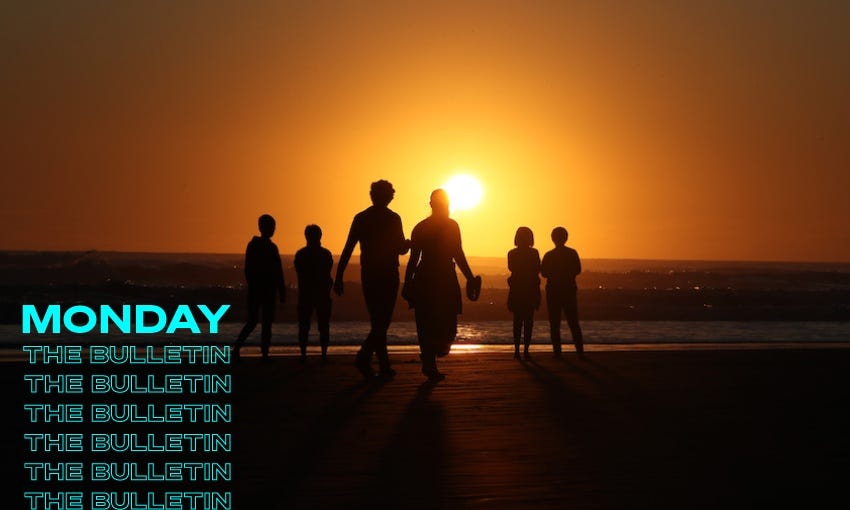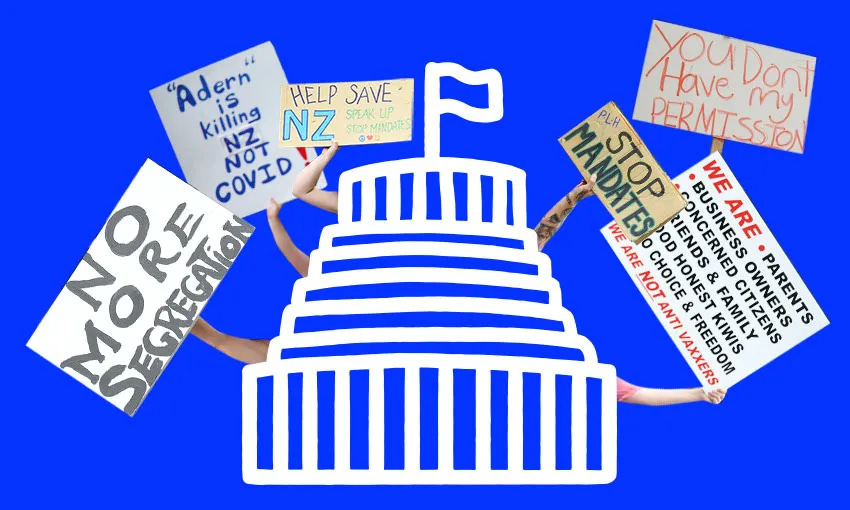The looming end of Covid restrictions
From mandates to vaccine passes at your local cafe, Covid rules are likely to start coming down quickly after cabinet meets today
Mōrena and welcome to The Bulletin for Monday, March 21, by Justin Giovannetti. Presented in partnership with Z Energy.
In today’s edition: New Zealanders volunteer to fight in Ukraine; Netflix crackdown on sharing; crisis at the BBC; but first, the end of Covid rules.
Sunset at Piha as NZ exited the first lockdown in 2020. (Hannah Peters / Getty Images)
Nearly two years after the first lockdown, the government is rapidly dismantling the system of Covid restrictions.
Cabinet is expected to look later today at ending the country’s system of vaccine mandates and the use of vaccine passes. An announcement would come Wednesday. Officials have previously indicated that some mandates, like in health, will likely remain in place. As RNZ reports, the traffic light system will be part of cabinet’s review, but its settings could be tweaked instead of scrapped. As for passes and mandates, their days are likely numbered according to the prime minister, who said Friday the systems won’t “need to be used as widely any more”.
There’s wide support in parliament for an end to most pandemic restrictions.
National has said the government should move to a five-day isolation periods for positive cases, while dumping the traffic light system, mandates and pre-departure tests for arrivals. As Bridie Witton writes for Stuff, the opposition also wants to see an end to QR code scanning. Act has put forward similar ideas in the past. While some of those proposals might seem drastic after two years of pandemic restrictions, others might think they are sensible and overdue. As a sign of the changed times we are entering, officials quietly moved on Friday to allow unvaccinated New Zealanders to enter the country and skip managed isolation. The government still hasn’t acknowledged the change. As RNZ reports, all unvaccinated citizens in MIQ were released as the new rules took effect. Permanent residents and all other travellers will continue to need to be vaccinated to enter New Zealand.
Omicron has now likely peaked in Aotearoa: Michael Baker.
Auckland likely peaked in early March and the rest of the country probably followed in the last fortnight in a "Mexican wave", Baker told the NZ Herald (paywalled). That doesn’t meant the pandemic or omicron are over, far from it. Some of the peaks across the country have been quite drawn out, especially in the South Island and around the capital. Hospitalisation numbers are still rising with an increase in deaths to follow. Omicron’s decline won’t be as fast as its rise, with the country now likely to hit its new baseline level of cases in May. That baseline won’t be the pre-omicron world, but will likely stick around a thousand or more daily cases, indefinitely.
The Spinoff’s Covid data tracker has the latest figures.
With the rules relaxing, we now face two new challenges.
The slowdown in the country’s major cities over the past few weeks, as hundreds of thousands choose to work remotely, isn’t due to lockdown. It’s personal choice. The end of restrictions won’t mean a return to 2019 living. Some restaurant owners in Auckland and Wellington told the Sunday Star-Times that they were being devastated by a lack of patrons. They blamed self-isolation rules, but it could also reflect the risk tolerance of New Zealanders during one of the world’s most significant omicron outbreaks. The rising cost of living isn’t a help either. How we adjust to omicron circulating is one challenge, now left with individuals rather than the collective. The second, also in the Sunday Star-Times, is how we deal as a society with the unvaccinated after the end of vaccine mandates. Some say they want people to stop treating them like outcasts, while others are done with vaccinated friends and family.
The generous support of our members powers all of The Spinoff's journalism, including live updates, the award-winning collaborations between Toby Morris and Siouxsie Wiles, and richly reported feature writing.
As we continue to struggle against commercial headwinds, contributions from our members are more critical than ever. If you value what we do and have the means to do so, please make a donation today and support our mahi.
There’s no law stopping New Zealanders from fighting for Ukraine.
Russia’s invasion of Ukraine is gaining steam after a bungled start, with the country’s military making substantial gains in the south and east. Over 20,000 foreigners have joined Ukraine’s volunteer forces, including some New Zealanders, The Spinoff reports. There’s nothing in our law stopping people, even former soldiers, from enlisting in a foreign military. On the economic front, the foreign affairs minister is promising more sanctions after the first tranche fell short of expectations. According to RNZ, no Russian with any assets in New Zealand has been targeted. The sanctions only cover Russia’s president, 12 senior politicians and Russian-backed militias in eastern Ukraine. In a statement, Greenpeace said that if the point of sanctions is to put pressure on the Russian government, a token move with zero impact won’t cut it.
Sharing your Netflix password might soon be a thing of the past.
Throughout its existence, Netflix has ignored friends and families who share an account across countries and continents. Honestly, it’s a rite of passage to shift from your parent’s account to one shared with friends. The company is now starting a trial where users will need to pay to share those passwords. As RNZ reports, it’s seen as the future direction for the streaming giant. Despite its global reach and massive production budgets, Netflix isn’t all that profitable. Along with crackdowns on sharing accounts, more price increases are likely.
From our partners at NEON: Before Jordan ascended, the ’80s LA Lakers put basketball on the map, elevating it from barely on TV to a global cultural phenomenon. Their astounding story is chronicled in Winning Time, a 10 part drama built around the enormous personalities and era-defining events which created this dynasty. The incandescent charisma of Magic, the moody yet brilliant Kareem, the vision of Pat Riley and the outlandish lifestyle of owner Jerry Buss – all rendered in kinetic style familiar from Adam McKay projects like The Big Short. Winning Time is highly stylised, with characters breaking the fourth wall and the story patched together rather than told in conventional narrative. If you loved any one of Succession, The Last Shot or the Wolf of Wall Street, this story of sex, drugs and incredible basketball is only on NEON and has to be next on your watchlist. (Sponsored)
Auckland’s siren battle might be noisy and misunderstood.
From Celine Dion to reggae, loud siren battles at all hours of the night can provoke contempt from locals. But as Justin Latif writes in The Spinoff, participants say it gives Pacific youth a positive alternative to night clubbing and gangs. It’s an emerging subculture, with over 5,000 followers in Auckland. While some locals might not like the loud sound at all, participants say the point is to stay out of trouble.
Long read: The BBC faces an ‘existential’ crisis.
Britain’s national broadcaster has been held up as the model for a merged TVNZ and RNZ to follow. However, as The Listener (paywalled under the NZ Herald) explains, the Beeb is struggling to adapt to the streaming generation. After the British government’s decision earlier this year to freeze the license fee, there’s been remarkably little pushback. Instead, the BBC now finds itself in the middle of a culture war, attacked by left and right, with few defenders coming forward.
Got some feedback about The Bulletin, or anything in the news? Get in touch with me at thebulletin@thespinoff.co.nz
Toby Manhire reports on the people vying to build a political force out of the parliament occupation. Charlotte Muru-Lanning asks experts for advice on what to do after you’ve recovered from Covid. Vincent O'Sullivan reviews the strange and slippery new novel by Lloyd Jones. Danyl McLauchlan on Too Much Money, a book about what divides us. Anna Sophia writes the Sunday Essay on 42.
White Ferns suffer narrow World Cup defeat to England.
The team said it was “devastated” after a one-wicket loss to England on Sunday in Auckland. The White Ferns now need to wait a week for it to become official, they are out of semifinal contention, writes Stuff. The team has a final round-robin match against Pakistan, but the damage has been done and they likely won’t continue in the tournament they are hosting.













